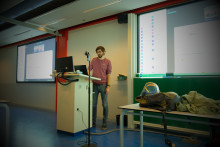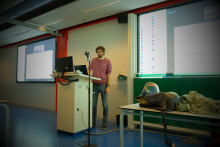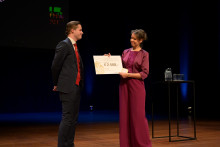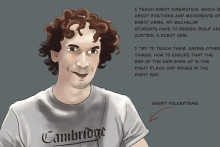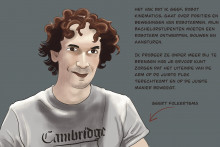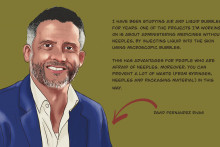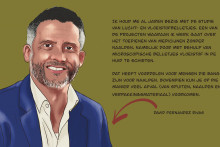Robin van Emmerloot, education consultant at CELT and one of the organisers, talks about the ins and outs of the market.
Why is this event organized?
'We as CELT already offered a blended learning masterclass for a small group of lecturers. As far as we were concerned, it was a shame to limit this topic to only a dozen lecturers. With this market, we want to offer tools for all UT teachers regarding blended learning.'
During the corona crisis, education took a hybrid form en masse. What is the difference between hybrid and blended education?
'You can think of blended learning as an umbrella term for the ways in which digital and physical education can be combined. Hybrid education is a form of that. What we saw during the corona crisis in particular was another subcategory: synchronous hybrid education, where students were able to attend lectures both physically and digitally. The point is: blended learning is an incredibly broad concept and we have many resources available to make it possible. But everything starts with the teacher themselves and the goals they are trying to achieve with their teaching.'
What can they expect to find at the market?
'Mostly experts. Among others we have e-learning specialists, education consultants, a video team and experts that can aid in setting up digital testing. Thanks to a partnership with the BMS Teaching Academy, we can hold the event in the atrium of Ravelijn. And perhaps a free lunch will help attract as many participants as possible. In any case, we hope that teachers will engage with colleagues and specialists on what the best fit is for their teaching style. After all, there is no gold standard and it requires a tailor-made approach. One subject may benefit from lots of physical lectures, while another may be better off using digital resources – like a podcast. I know a maths teacher who was used to giving lectures in front of hundreds of students in the Waaier. But he came to the conclusion that he could use everyone's time much more effectively by recording all kinds of short video lectures. We aim to aid in ensuring that one can use their teaching as effectively as possible.’
What role could blended learning fulfil for the UT in the future?
'I know that a central education vision is currently being worked on, in which the way we want to use the campus is emphasized. Take for instance the recent lack of space. Then you quickly come to the conclusion that blended learning is going to have an important place in our education.'
Did the corona crisis specifically make a mark on that?
'It has disrupted the status quo for all kinds of innovations and teachers have already invested a lot in the past two and a half years. Now you see things are settling down a bit; a lot of those online quizzes that teachers used before, are no longer there. But certain standards have shifted. Students are more inclined not to come to campus if they know a PowerPoint presentation will be shown that is found on Canvas anyway. And teachers actually want to interact with their students. It's really not enjoyable to talk to a screen. Everyone has to find their way in this.'
Finally, will this Blended Learning Market become a recurring event?
'Not at the current scale, but we would certainly want to use a similar set-up. In fact, we are currently developing a Learning & Teaching Lab in the Citadel. That will not only be a professional lab space for teachers, but also kind of an IKEA showroom, with all the latest toys and all kinds of educational innovations and developments. I expect we will organise many walk-in events and open days there.'
The Blended Learning Market will take place on Wednesday, November the 30th from 12:15 until 13:30 in the atrium of Ravelijn.


